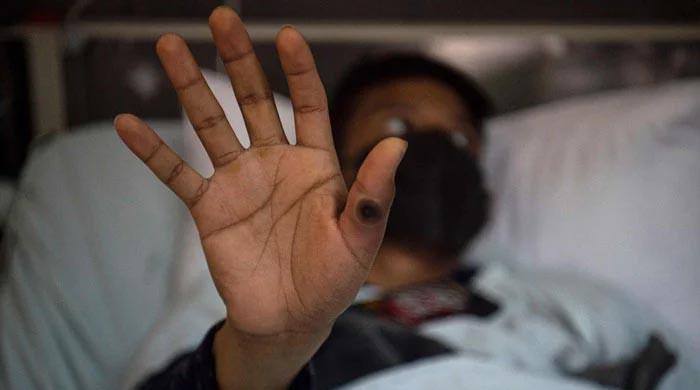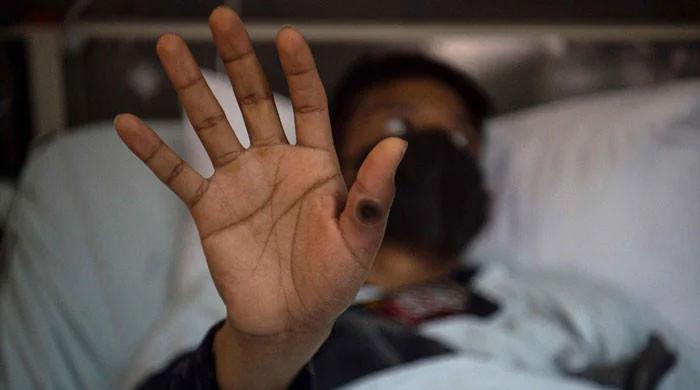Hina*, a 22-year-old mother of two from rural Sindh, tragically lost her third child due to complications during childbirth. Her story is one of the many heart-wrenching reminders of the devastating consequences of inadequate access to reproductive health services and family planning education in Pakistan. Millions of women in the country face risks due to a lack of knowledge and resources, leading to unplanned pregnancies, unsafe abortions, and maternal mortality.
The absence of reproductive health education and family planning services has far-reaching consequences, affecting not only the health and well-being of women but also the economic prosperity of families and communities. When women are unable to plan their families, they are more likely to experience poverty, malnutrition, and poor health outcomes, perpetuating cycles of disadvantage.
Educating females about reproductive health and family planning is crucial for preventing such tragedies and empowering women to make informed decisions about their lives. In Pakistan, where only 34% of women use family planning methods and 40% lack access to female healthcare, the need for awareness and education is dire. The statistics are alarming: 4.2 million unplanned pregnancies and 2.2 million abortions annually, with young women desiring an average of four children but having only two due to lack of access to family planning services.
Pakistan is the sixth most populous country in the world with 208 million people and a population growth rate of 2.4% per year. The population dynamics pose challenges to national development, economic growth, and security. To address these challenges, it's essential to take the conversation to the parliamentarian level, ensuring policies and programs support reproductive health and family planning initiatives. Parliamentarians have a critical role in championing women's rights and advocating for enhanced access to reproductive health services, particularly in underserved areas.
Recently, the Sustainable Development Policy Institute (SDPI) and United Nations Population Fund (UNFPA) organised a seminar for Sindh's parliamentarians, a crucial step towards mobilising political will and action. However, this is just the beginning. Many more efforts are needed to educate individuals and policymakers about the importance of reproductive health and family planning. The consequences of inaction are too severe to ignore – we must act now to ensure a brighter future for Pakistan's women and girls.
The alarming reality
Pakistan faces a reproductive health crisis, with staggering numbers of unplanned pregnancies and abortions. According to a report by the Guttmacher Institute, ‘Unplanned Pregnancy and Abortion in Pakistan’, 50% of pregnancies in Pakistan are unplanned, while the World Health Organization reports that one in five pregnancies end in abortion. This translates to approximately 2.2 million abortions annually, with a devastating 80% being unsafe, leading to serious health complications and even death. In fact, unsafe abortions account for 12% of maternal deaths in Pakistan, as per the Pakistan Demographic and Health Survey.
The root cause of this crisis lies in the lack of access to family planning services. According to the Pakistan Demographic and Health Survey by National Institute of Population Studies, only 35% of married women use modern contraceptive methods, while 20% have an unmet need for family planning. This means millions of women are unable to make informed decisions about their reproductive health, leading to a cycle of unplanned pregnancies and unsafe abortions.
The situation is exacerbated by a lack of access to female healthcare, with 40% of the population unable to access essential services. Improved supply chains and involvement of the private sector in underserved areas are crucial to address this gap.
The power of family planning
Family planning is a fundamental aspect of reproductive health, enabling individuals to make informed decisions about their fertility and plan their families. In Pakistan, where one in every five women desire to use contraceptives but lack access, family planning is crucial for preventing unwanted pregnancies, reducing unsafe abortions, and saving lives.
Family planning was declared a basic human right at the United Nations International Conference on Human Rights in 1968. This rights-based approach ensures that individuals have the right to determine freely and responsibly the number and timing of their children, with access to quality information and services, free from discrimination and coercion.
It prevents maternal deaths, saves children's lives, and ensures that every pregnancy is intended. Unfortunately, Pakistan has lower use of modern contraceptives compared to other countries in the region, with only 26% of women aged 15-49 years using a modern method. This highlights the need for improved access to family planning services, which is imperative for saving lives.
The UNFPA works closely with the Government of Pakistan to increase the uptake of family planning information and services. The goal is to enable an estimated 5.8 million women to become additional users of modern contraception.
Access to contraceptive information and services is central to achieving gender equality. When women are empowered to plan their families, they are better enabled to complete their education, have more autonomy within their household, and improve their earning power. This strengthens their economic security, education, health, and well-being, as well as that of their children and family.
By recognising the importance of family planning, we can ensure that individuals have the freedom to make informed decisions about their reproductive health, saving lives, empowering women, and building a brighter future for all.
Steps taken to address the crisis
Pakistani authorities have taken various steps to address the country's reproductive health challenges, recognising the critical need to improve access to family planning information and services. In collaboration with the UNFPA, the government aimed to enable an estimated 5.8 million additional women to use modern contraception by 2022, a significant step towards reducing the unmet need for family planning.
Pakistan has also committed to the Family Planning 2020 (FP2020) initiative, pledged to add 6.7 million new users of modern contraception by 2020 and achieve a contraceptive prevalence rate of 50%. This commitment demonstrates the government's dedication to addressing the country's high population growth rate and improving the health and well-being of its citizens.
Pakistan has also made commitment to the FP2030 with a vision that, “by the end of 2030, Pakistan envisions a society where women and girls are empowered and all couples enjoy basic rights to decide the number of their children freely and responsibly by maintaining a balance between their family size and resources, make informed choices to achieve a prosperous, healthy, and educated society.”
The vision includes adapting and implementing evidence-based progressive policy reforms with political will and enabling an environment at all levels, universal access to services to lower fertility rates and address unmet need for contraception, address information and service needs specially to remote areas, gearing for Uniform Understanding of National Narrative, contraceptive commodity security and efficient supply mechanism, legislative support, institutionalisation of human development and system strengthening to sustain family planning efforts, and monitoring and evaluation for results and effectiveness.
Given due consideration that population is a cross-cutting issue, which has its linkages with the most important issues relating to poverty, health, illiteracy, environment, climate change, economic instability, etc, the Government of Pakistan has developed a New National Narrative under the theme “Tawazin” (meaning middle of the course) and decide the family size according to the resources, enabling to fulfill the fundamental rights of all.
The UNFPA advocates widely at the policy level to ensure that family planning is embraced as a basic human right. This rights-based approach ensures that individuals can determine freely and responsibly the number and timing of their children, with access to quality information and services, free from discrimination and coercion. By empowering individuals, particularly women, to make informed decisions about their fertility, UNFPA works to address the social and cultural barriers that often limit access to family planning services.
Efforts are also being made to improve access to contraceptives, particularly for women who wish to use them but lack access. This includes increasing the availability, accessibility, acceptability, and quality of family planning services, ensuring that individuals can obtain the information and resources they need to plan their families.
By addressing these critical gaps in family planning services, Pakistani authorities and UNFPA aim to reduce the country's high rates of maternal mortality, unsafe abortions, and unintended pregnancies, ultimately improving the health and well-being of women and families across Pakistan.
Progress Made
Significant progress has been made in improving antenatal care in Pakistan, with coverage increasing from 30% in 1990-91 to 77% in 2020. However, despite this achievement, challenges persist in ensuring access to quality reproductive healthcare.
Dr Rubina Ali, Assistant Country Representative for UNFPA, emphasised the need for a rights-based approach to family planning, and said, "Population management transcends mere control. It is about empowering individuals with the right to plan their families and access essential resources."
Dr Rubina urged parliamentarians to advocate for enhanced access to contraceptives and family planning services.
The SDPI plays a crucial role in advocating for reproductive health policies and family planning in Pakistan. According to Syed Ali Wasif Naqvi, Senior Research Associate and Head of Policy Advocacy & Outreach at SDPI, "SDPI provides research-based insights and policy analysis that inform and strengthen the efforts of these organizations." SDPI's collaboration with UNFPA and similar organisations ensures that its research contributes to more effective advocacy and policymaking in healthcare, including reproductive health and family planning.
Looking ahead, SDPI plans to continue its research and policy advocacy efforts in the broader healthcare sector, with a focus on data development for reproductive health. "Future initiatives may include more focused research on reproductive health challenges in Pakistan and developing policy briefs that guide effective interventions. SDPI aims to partner and collaborate with organizations that can drive systemic change and improve health outcomes nationwide,” explained Naqvi.
Persistent challenges
Despite progress made in improving reproductive healthcare in Pakistan, several challenges persist. Accessibility remains a significant issue, particularly for women in rural or remote areas. They face constraints in accessing essential healthcare services, including quality antenatal and postnatal care, reproductive health, breast cancer treatment, and fistula treatment. The biggest gap is in delivery in hospitals, with only 64% of women in rural areas and 85% in urban areas delivering in hospitals. In rural areas, a staggering 66% of women consider distance to health facilities a major problem.
According to Naqvi, the implementation of reproductive health policies in Pakistan faces several challenges, including cultural barriers, lack of awareness, inadequate healthcare infrastructure, and insufficient funding. “Addressing these challenges requires a multifaceted approach that includes increasing public awareness, enhancing healthcare services, and ensuring that policies are culturally sensitive. The importance of community engagement and the need for stronger governance to ensure that policies are effectively translated into practice cannot be ignored,” added Naqvi.
He also emphasised the crucial role of the private sector in expanding access to reproductive health services, particularly in underserved areas. “The private sector has a key role in expanding access to reproductive health services by partnering with public health organizations and supporting public health initiatives, particularly in underserved areas. SDPI suggests that incentivizing private healthcare providers through public-private partnerships could enhance service delivery,” he said, adding that, collaborations with the private sector should focus on capacity building and service expansion, especially in rural and underserved regions. “This will ensure that reproductive health services are accessible to all and help bridge gaps in service provision and improve overall health outcomes.”
The unfinished agenda
Huge disparities persist between young women's desires and their reality when it comes to reproductive health in Pakistan. On average, women desire four children, but the reality is that they have only two. This significant gap has far-reaching implications for reproductive health outcomes and highlights the unfinished agenda in this critical area.
According to Naqvi, "Although SDPI's direct involvement concerning family planning is limited, the organisation recommends integrating reproductive health into broader healthcare and development policies."
He emphasised that SDPI's research in healthcare shows that infrastructure, improving data collection methods, and building a multi-sectoral collaboration can help overcome challenges in reproductive health policy implementation. "SDPI advocates for evidence-based policy that reflects the unique socio-economic context of Pakistan," said Naqvi.
Naqvi also highlighted the crucial role of education, particularly girls' education, in improving reproductive health outcomes. "Education, especially for girls, is crucial in improving reproductive health outcomes. Educated women are more likely to make informed decisions about their health and family planning," he said, adding that SDPI advocates for girls' education and enrollment of out-of-school children.
“Our prime focus is on the policies that promote girls' education as a means to improve reproductive health," said Naqvi. Underscoring the empowering effect of education on women, he said, "Education empowers women to understand and exercise their rights, leading to better health outcomes and more sustainable development."
The role of parliamentarians
Parliamentarians play a vital role in championing women's rights and advocating for enhanced access to reproductive health services. Dr Abid Qaiyum Suleri, Executive Director of SDPI, said, "Access to sexual reproductive health and family planning services is not only a matter of public health but also crucial for promoting sustainable economic growth. Parliamentarians play a key role in policy-making that will lead to a more balanced population growth and a better future for Sindh."
Dr Suleri stressed the importance of mobilising dialogue on political will and enabling environment for the successful implementation of the National Action Plan on Family Planning and the Family Planning 2030 (FP2030).
Shaheena Sher Ali, Sindh Minister for Women Development, reaffirmed the Sindh government's commitment to working on family planning and reproductive health awareness as fundamental rights: "The Sindh government will implement policies in the province that promote reproductive health and underscore the connection between population and sustainable economic growth. As members of the Sindh Assembly, we must ensure that every citizen in Sindh has access to the reproductive health services they need, especially in rural areas."
Dr Jamil Ahmad Chaudhry, Program Specialist at UNFPA, highlighted the urgent need for parliamentary engagement to achieve the Council of Common Interests' goals, addressing key challenges such as lack of access to female healthcare and the need for improved supply chains.
Naqvi highlighted that through policy dialogues, advocacy initiatives, conferences, and collaborative projects, SDPI ensures that its research reaches key decision-makers. “Our partnerships with UN agencies and other international bodies help align national policies with global best practices, including those related to healthcare including our recommendations for female healthcare,” he shared.
What to expect?
The path forward requires sustained efforts and collective action. As Naqvi said, "We plan to maintain our efforts in providing data-driven insights and facilitating multi-stakeholder dialogues. With our research informing policy and practice, we can drive progress towards achieving the goals outlined in the FP2030 framework."
This commitment to evidence-based decision-making will be critical in addressing the complex reproductive health challenges facing Pakistan. “At SDPI, our strategy involves around building stronger networks, engaging in capacity-building initiatives, and ensuring that the focus on SRH and FP remains a priority in the national discourse,” said Naqvi.
The call to action remains: to bridge the gaps, prioritize women's and girls' health, and ensure every individual's right to reproductive health and family planning. The journey ahead is long, but collective efforts can ignite transformative change, empowering individuals, communities, and the nation to thrive.
*Name changed to protect identity


 Technology6 مہینے ago
Technology6 مہینے ago
 Pakistan6 مہینے ago
Pakistan6 مہینے ago
 Sports6 مہینے ago
Sports6 مہینے ago
 Pakistan6 مہینے ago
Pakistan6 مہینے ago
 Entertainment6 مہینے ago
Entertainment6 مہینے ago
 Pakistan6 مہینے ago
Pakistan6 مہینے ago
 Entertainment6 مہینے ago
Entertainment6 مہینے ago
 Pakistan6 مہینے ago
Pakistan6 مہینے ago










